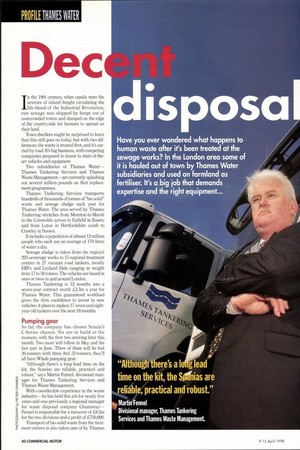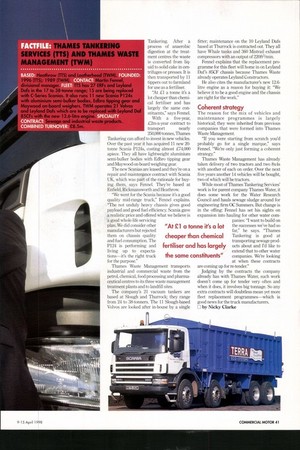Dec disposa Have you ever wondered what happens to human
Page 42

Page 43

If you've noticed an error in this article please click here to report it so we can fix it.
waste after it's been treated at the sewage works? In the London area some of it is hauled out of town by Thames Water subsidiaries and used on farmland as fertiliser. It's a big job that demands expertise and the right equipment... HAMES TANKERING TS) AND THAMES WAS MANAGEMENT (TWM) ath row (US and Leatherhead (TWM).
; 1989 ( CONTACT: artin Fenne , divisional manager. ERFs and Leyland Dafs in the 17 to 38-tonne range; 15 are being replaced with C-Series Scanias. It also runs 11 new Scania P124s with aluminium semi-bulker bodies, Edbro tipping gear and Maywood on-board weighers. TWM operates 21 Volvos and Leyland Dafs which are to be replaced with Leyland Da e new 12.6-litre engine.
CONTRACT: wa•e and industrial waste roducts. COMBINED TURNOVER: /n the 19th century, when canals were the arteries of inland freight circulating the life-blood of the Industrial Revolution, raw sewage was shipped by barge out of overcrowded towns and dumped on the edge of the countryside for farmers to spread on their land.
Town dwellers might be surprised to learn that this still goes on today, but with two differences: the waste is treated first, and it's carried byroad. It's big business, with competing companies prepared to invest in state-of-theart vehicles and equipment.
Two subsidiaries of Thames Water— Thames Tankering Services and Thames Waste Management—are currently splashing out several million pounds on fleet replacement programmes.
Thames Tankering Services transports hundreds of thousands of tonnes of "bio solid" waste and sewage sludge each year for Thames Water. The area served by Thames Tankering stretches from Moreton-in-Marsh in the Cotswolds across to Enfield in Essex; and from Luton in Hertfordshire south to Crawley in Sussex.
It includes a population of almost 12 million people who each use an average of 170 litres of water a day.
Sewage sludge is taken from the region's 293 sewerage works to 15 regional treatment centres in 27 vacuum road tankers, mostly ERFs and Leyland Dafs ranging in weight from 17 to 38 tonnes. The vehicles are based in ones or twos in and around London.
Thames Tankering is 12 months into a seven-year contract worth £23m a year for Thames Water. This guaranteed workload gives the firm confidence to invest in new vehicles: it plans to replace 17 seven and eightyear-old tankers over the next 18 months.
Pumping gear So far, the company has chosen Scania's C-Series chassis. Six are in build at the moment, with the first two arriving later this month. Two more will follow in May and the last pair in June. Three of them will be 6x4 26-tonners with three 8x4 32-tonners; they'll all have Whale pumping gear.
'Although there's a long lead time on the kit, the Scanias are reliable, practical and robust," says Martin Fennel, divisional manager for Thames Tankering Services and Thames Waste Management.
With considerable experience in the waste industry—he has held this job for nearly five years and was previously a regional manager for waste disposal company CleanawayFennel is responsible for a turnover of £8.5m for the two divisions and a profit of £750,000.
Transport of bio-solid waste from the treatment centres is also taken care of by Thames Tankering. After a process of anaerobic digestion at the treatment centres the waste is converted from liquid to solid cake in centrifuges or presses. It is then transported by 11 tippers out to farmland for use as a fertiliser.
"At £1 a tonne it's a lot cheaper than chemical fertiliser and has largely the same constituents," says Fennel.
With a five-year, £2m-a-year contract to transport nearly 250,000 tonnes, Thames Tankering can afford to invest in new vehicles. Over the past year it has acquired 11 new 20tonne Scania P124s, costing almost £74,000 apiece. They all have lightweight aluminium semi-bulker bodies with Edbro tipping gear and Maywood on-board weighing gear.
The new Scanias are leased and they're on a repair and maintenance contract with Scania UK, which was part of the rationale for buying them, says Fennel. They're based at Enfield, Rickmansworth and Heathrow.
Thames Waste Management transports industrial and commercial waste from the petrol, chemical, food processing and pharmaceutical centres to its three waste management treatment plants and to landfill sites.
The company's 21 vacuum tankers are based at Slough and Thurrock; they range from 24 to 38-tonners. The 11 Slough-based Volvos are looked after in-house by a single fitter; maintenance on the 10 Leyland Dafs based at Thurrock is contracted out. They all have Whale tanks and 360 Mistrail exhaust compressors with an output of 220ft3/min.
Fennel explains that the replacement programme for this fleet will home in on Leyland Daf 's 85CF chassis because Thames Waste already operates Leyland Constructors.
He also cites the manufacturer's new 12.6litre engine as a reason for buying it: "We believe it to be a good engine and the chassis are right for the work."
Coherent strategy The reason for the mix of vehicles and maintenance programmes is largely historical; they were inherited from previous companies that were formed into Thames Waste Management.
"If you were starting from scratch you'd probably go for a single marque," says Fennel. "We're only just forming a coherent strategy."
Thames Waste Management has already taken delivery of two tractors and two 8x4s with another of each on order. Over the next five years another 14 vehicles will be bought, two of which will be tractors.
Judging by the contracts the company already has with Thames Water, such work doesn't come up for tender very often and when it does, it involves big tonnage. So any extra contracts will doubtless mean yet more fleet replacement programmes—which is good news for the truck manufacturers.
El by Nicky Clarke










































































































